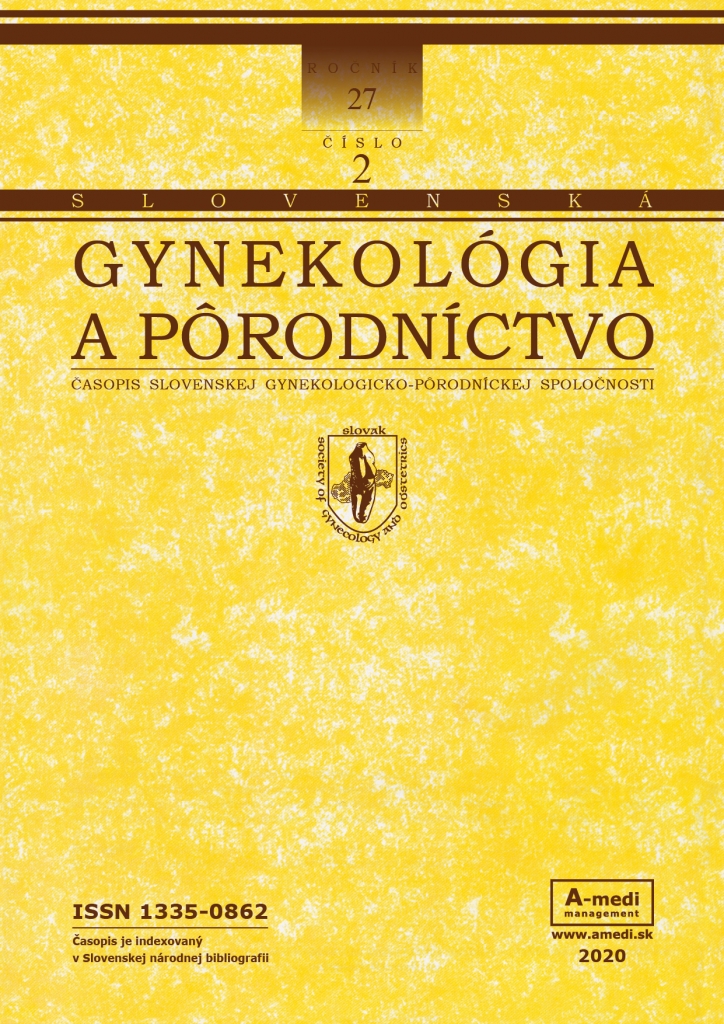
Slovak Gynecology and Obstetrics
- Článok
- Obsah 3/2019
- Archív
- Voľne dostupné články
- Redakčná rada
- Pokyny pre autorov
- Autodidaktické testy
Téma: Original works
ANALYSIS OF THYROID DISEASE SCREENINGS IN PREGNANCY IN THE SLOVAK REPUBLIC
J. BIELIK, V. KMEČOVÁ, M. BIELIK, M. FAKTOR
Goals: This work aims to find out the adherence to the professional provisions of the Slovak Ministry of Health Guidelines for the diagnosis and treatment of thyroid autoimmune diseases in women during pregnancy (Journal of the SR 39, 2009, p. 33-39),
in practice and consequently their clinical and cost effectiveness.
Methods: The basic group were women from the records of the health insurance company Dôvera, a. s. with diagnoses E.00 to E.07 who first visited a gynaecologist in 2016, with no endocrinology record from 2015. During the gynaecologist’s visit, a blood sample was taken for TSH and aTPO (4434-determination of ultra-sensitive TSH). Women who were sent by gynaecologists for endocrinological examination within three months of TSH collection were included in the trial and were followed up until the end of the year 2017. As an individual group, there were evaluated pregnant women who had a documented visit to the endocrinologist in 2015 or 2016.
Results: The group consisted of 16 891 women. 5 901 women (34.9%) had documented TSH sampling (up to 3 months after examination). 526 women (3.1%) had a subsequent endocrinological examination. In this group, 210 women (1.2%) were prescribed thyroid drugs. Of these, 6 were treated with thyreostatic therapy (2.9%) and 204 women were treated with thyroid replacement therapy (97.1%). The cost of TSH and blood collection at a gynaecological clinic in this group was € 47 857.11, aTPO - € 67 271.40, USG thyroid examinations - € 6 423.70, endocrine examinations - € 13 314.00 and medicine - € 1 055. 37. A total of 2,587 (15.3%) women had thyroid disease before pregnancy, with 905 of them taking thyroid drugs (5.4%). The cost of one case of newly diagnosed thyreopathy was € 258,40, and the cost of the treatment of newly diagnosed thyreopathy was € 647. 30.
Conclusions: The screening program is clinically and economically effective; the problem is the low level of thyroid laboratory examinations in gynaecological practice.
Ročník 2019 Témy časopisu Slovak Gynecology and Obstetrics 3 / 2019
Original works
Overview works
Case studies
doc. MUDr. Martin Redecha, PhD.
EDITORIAL BOARD
prof. MUDr. Miroslav Borovský, CSc.
prof. MUDr. Ján Danko, CSc.
prof. MUDr. Karol Holomáň, CSc.
MUDr. Ľudovít Janek
prof. MUDr. Štefan Lukačín, PhD.
prof. MUDr. Miloš Mlynček, CSc.
prof. MUDr. Ján Štencl, CSc.
doc. MUDr. Ivan Hollý, CSc.
doc. MUDr. Miroslav Korbeľ, CSc.
doc. MUDr. Jozef Višňovský, PhD.
doc. MUDr. Pavol Žúbor, DrSc.
doc. MUDr. Igor Rusňák, PhD.
MUDr. Jozef Adam
MUDr. Tibor Bielik, PhD.
PUBLISHER
Slovenská gynekologicko-pôrodnícka spoločnosť
Adresa: Antolská 11, 851 07 Bratislava
IČO 31802800, DIČ 2021515243
telefón-fax: 02/68 67 2 725
e-mail: slovenskagynekologia@gmail.com
EDITORIAL OFFICE OF JOURNAL
A-medi management, s. r. o.
Kupeckého 3,821 08 Bratislava
IČO: 44057717
telefón-fax: 02/55 64 72 47
e-mail: amedi@amedi.sk, www.amedi.sk
EDITOR-IN-CHIEF
Ing. Danica Paulenová
e-mail: paulenova@amedi.sk
GRAPHIC LAYOUT AND TYPESETTING
Lucia Vecseiová
e-mail: dtp@amedi.sk
MARKETING MANAGER
Ing. Dana Lakotová
mobil: 0903 224 625
e-mail: marketing@amedi.sk
LANGUAGE PROOFREADING
Mgr. Eva Doktorová
PROOFREADING OF ENGLISH TEXTS
Mgr. Jana Bábelová
ECONOMY AND SUBSCRIPTIONS
Ing. Mária Štecková
telefón: 02/55 64 72 48
mobil: 0911 117 949
e-mail: ekonom@amedi.sk

